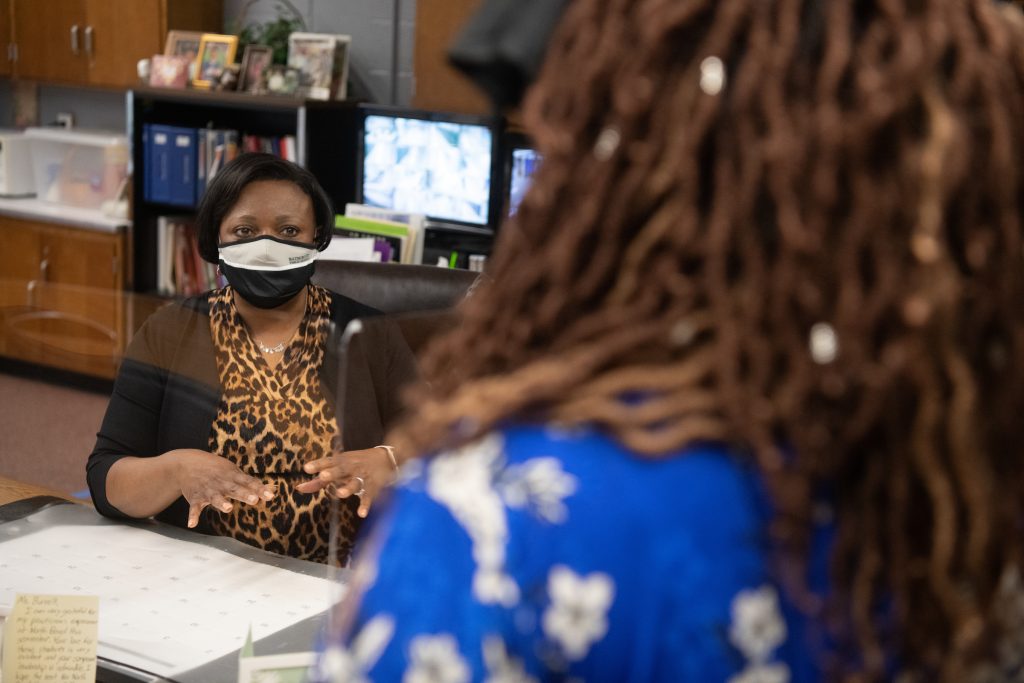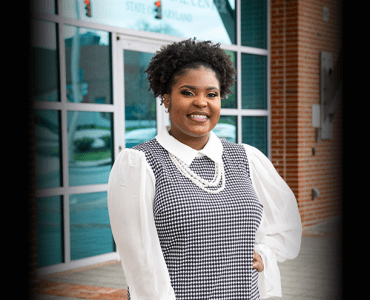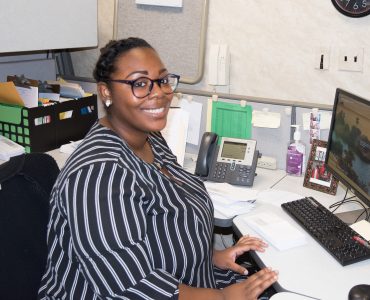When schools shut down around the country in 2020, children’s lives were turned upside-down: learning via screens, physically distancing from friends, and worrying about a global pandemic.
Providing support for their emotional well-being and education has been at the forefront of many Americans’ minds. And a University of Maryland School of Medicine (UMSOM) organization — the National Center for School Mental Health (NCSMH) — is sharing its expertise to do just that.
The mission of NCSMH, founded in 1995, is to strengthen policies and programs in school mental health to improve learning and promote success for children. NCSMH clinicians have pivoted the services they provide in Baltimore City and Prince George’s County schools to provide tele-mental health and continue to offer an array of supports for thousands of students and their families.
“We are definitely seeing some increased anxiety and depression and feelings of isolation,” said NCSMH co-director Nancy Lever, PhD, associate professor, Division of Child and Adolescent Psychiatry, UMSOM. “Students are missing being in the classroom, being able to see and experience the school setting, and have recess and do collaborative activities with their classmates. It definitely has been challenging for them not to have that in-person social-emotional learning and academic learning.”
Lever said one of the greatest obstacles the center faced when schools closed was technology.
“A lot of our youth and families didn’t have the computers, the resources that they needed. We needed to work with the school systems to make sure that everyone had the technology,” she said.
She added that while “there wasn’t a pathway for all of this, there wasn’t a handbook to turn to,” NCSMH did have a foundation to build upon.
“We know many of the best practices, so we needed to turn to what we knew and build on them,” she said. “To think about, ‘What can we do now?’ to continue to provide the services and supports that we felt our students could really benefit from.”
The center also has had to confront systemic racism from the lens of schools and children.
It has collaborated with the Central East Mental Health Technology Transfer Center, funded by the Substance Abuse and Mental Health Services Administration, to develop a training for educators and school staff on addressing cultural responsiveness and equity in schools. The center also is taking part in a Patient-Centered Outcomes Research Institute-funded project to promote mental health literacy in students and educators, and it is providing training to clinicians on strategies to address diversity, equity, and inclusion.
“We have been focused on education and training for our school mental health providers related to understanding racial inequities, recognizing their own biases, and effectively responding to racial injustice in schools,” Lever said. “We are helping clinicians to be better able to address topics of racial injustice in their clinical work with youth, families, and school staff.”
The center has decades of experience in dealing with traumas such as those seen over the past year. Its clinicians have been trained in evidence-based individual and school-based group interventions for students experiencing stress or trauma, including the grief associated with losing loved ones. Students and their caregivers can be part of individual, group, or family therapy sessions.
“We have trained school staff on being able to identify signs and symptoms that may be indicative of stress or trauma, how to make referrals to mental health supports, and have offered guidance on strategies to better support youth in the classroom who have experienced stress,” Lever said.
Learning Models
Over the past year, NCSMH also has addressed the learning models — virtual, hybrid, and in-person — that schools have navigated because of COVID-19 by developing resources, conducting webinars and tutorials, and providing technical assistance to state departments of education and school districts nationally.
“Our entire team jumped in when we recognized that our young people and our educators are suffering and trying to navigate this new world of learning,” said NCSMH co-director Sharon Hoover, PhD, professor, Division of Child and Adolescent Psychiatry, UMSOM. “Some of the supports we’ve been able to provide are policy and practice guidance on how to support students’ mental health from a distance learning perspective and how to integrate social-emotional learning into the classroom.”
NCSMH shifted some of its research to examine the impact of COVID-19 on mental health services in schools and what services are needed to adjust as schools reopen. One study is a randomized, controlled trial funded by the National Institute of Justice to examine the trauma-informed supports in schools.
“Now we’re taking a look at how those supports have had to change in terms of screening for young people coming back to schools: Have they experienced new traumas? Are there ways that it’s impacting their learning that we may not have even imagined before the pandemic?” Hoover said.
Not only is the center providing individual and family services, but it also is working with teachers and parents, who have taken on a new role with virtual learning.
“We know teachers are incredibly burdened and stressed right now. We hope that schools will continue to put well-being structures in place for educators to support a healthy workforce because if they’re not well, it’ll be really hard to support students’ mental health,” Hoover said.
“And our families need to give themselves permission to not be perfect during this time. We know that parents are layering on many responsibilities, so they need to take care of themselves. Parents and teachers are going to be the eyes and ears for when things go awry with their children and students, so it is important that they are ready to identify issues and support them, as needed.”

Working with a Baltimore School
Nikita A. Parson, LCSW-C, a NCSMH clinician at North Bend Elementary/Middle School in Baltimore, works closely with the school-based social worker, Carrie Oddis, LCSW-C. They typically talk two or three times a week to identify strategies, discuss treatment courses, and implement 504 plans, which schools develop to provide support to students with disabilities.
Parson and Oddis say they’ve seen an increase in student anxiety and depression over the past year.
“The majority of the children I work with struggled during the pandemic,” said Parson, adding that some families had financial difficulties because of layoffs or dealt with limited supervision because parents are essential workers.
“Some students became more anxious about online learning as well as the health of their families, found it difficult to access academic supports, struggled with decreased peer interactions, and became more depressed,” she said.
Parson said the increase in the use of technology became an issue for students’ mental well-being as well.
“I found that the longer the pandemic lasted, the less structure families had when it came to bedtimes, screen use, and food intake, which all affected students’ mental health,” Parson said. “As a program, we have continued to meet with families virtually to provide individual, family, and group counseling as well as prevention activities.”
Oddis said Parson and NCSMH’s team give the students a “safe space to share their experiences and learn and implement strategies to help them cope in various situations.”
North Bend principal Patricia Burrell agreed that the NCSMH team has provided invaluable supports.
“The clinicians have helped us contact some of the hard-to-reach students and families during the pandemic. They have also assisted the engagement team with contacting families that have poor attendance,” said Burrell, adding that the school-based and NCSMH clinicians have provided individualized support to students struggling with current events through one-on-one meetings as well as virtual lunch bunches.
‘Caring, Hardworking’ Team
Lever praised the NCSMH team of about 100 — psychologists, social workers, professional counselors, psychiatrists, and researchers as well as others — as “caring, hardworking, committed, incredibly flexible, and absolutely creative.”
“At the end of the day, all of the work that we do comes down to the well-being of our young people, our children, and our adolescents that we serve both locally in our schools and also nationally,” Hoover added.
Parson said she has been able to give students returning to in-person learning at North Bend encouragement from a distance, and Oddis and Burrell say the students are adjusting well.
“It has been great seeing the students smile with their eyes, hearing their laughter, and witnessing their resilient attitudes and behaviors,” Oddis said.
Lever said the NCSMH team is excited to return to its in-person work in schools. “We are very much ready and prepared to return,” she said. “Our goal is to continue to provide that full continuum of care.”




